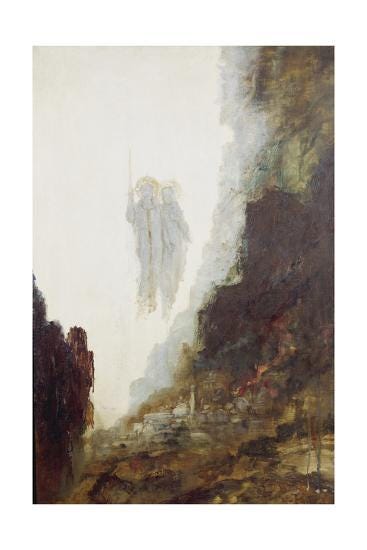First version published @ LapsusLima on March 28, 2020.
COVID-19 will favour aesthetic interpretations like no public health crisis in shared memory since AIDS.
The most remarkable aesthetic mechanism of the Covidian appears to be revelation, an aesthetics of epic time and epochal time-suspension; flanked by the Apollonian tragic, an aesthetics of sacrifice and pharmakoi, and the Dionysian panic as aesthetics of invasion.
Revelation is mind-shattering and world-destroying, because it entails simultaneous irreversibility and reversal. It is the aesthetic culmination of the world-upside-down trope—a leading indicator of which is transvaluation.
Like Semele, we have been granted the appalling privilege of staring God in the face with two possible outcomes: death, or some sort of permanent scarring. We’re all Cain now. No one will remain unmarked. And—on this scale—revelation may be singularly [pan]democratic.
Even as Anubis seroassays the individual hearts of men, it is telling that our great collective revelation led with Plague, the crowned horseman of the apocalyptic square. It’s almost forced, inelegant; as if prescripted for a tone-deaf audience.
Pseudo-fatality prevails. Form will be wrought not from marble but flesh, with a cleaver.
Revelation is the great epistemic aesthetic experience, premised on the violent curren[t]cy exchange between thesis and antithesis, the phantasm of synthesis flung into the featureless future as anxiety, or unsustainable desire [despair].
And in this cruelty there will be clarity. The doors of perception are cleansed. We’re seeing everyone as they are—naked, on the end of a fork and everything as it is: [in]finite. Here is our Nietzschean noon.
Moreau, Gustave. The Angels of Sodom. ~1890.
NOTES
This text turned out to be optimistic. Early CV19 was a Great Filter event, which spliced us in two: those who passed, and those who—for any number of reasons—could not.
Not all of these losses are due to stupidity or ignorance: there is such a thing as being in the wrong place at the wrong time. Some are still stuck in the filter, and some among them will —despite all efforts— still not make it through. I will eventually discuss this in the context of survivor’s guilt.
It also introduces my takes on the tragic, the panic, and anxiety as libidinal despair [evolved as vertigo]; as well as a number of terms I’ll be revisiting at greater length: transvaluation, reversal [inversion], etc. Here, too, was my first use of #CovidianAesthetics (in the original title).
As to the temporal implications of the closing paragraph:





